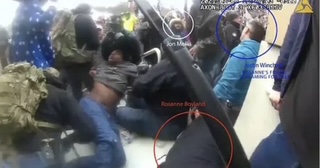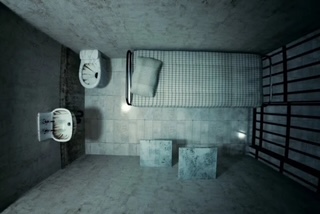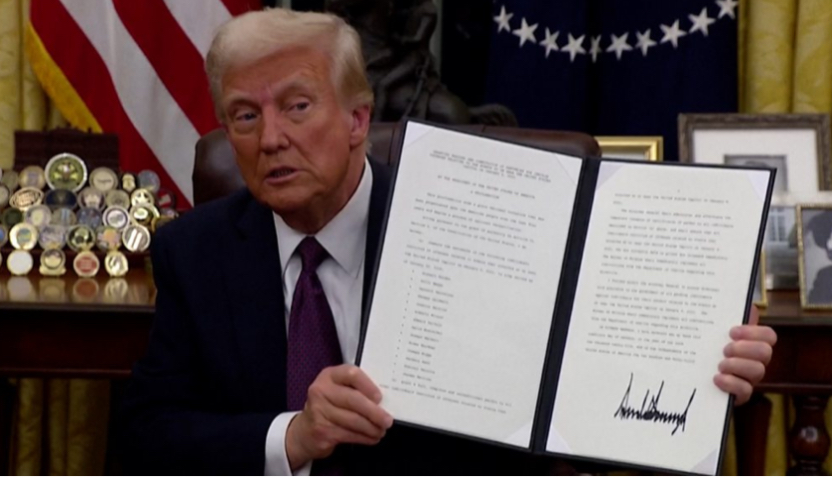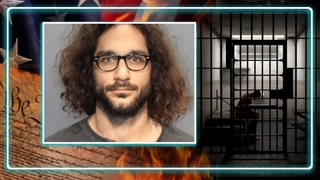Guest Post by Patriot Legal Defense
After nearly four years in prison, including two in solitary confinement, Jon Mellis is free. But his release last September exposes a criminal justice system that traps millions in a cycle of punishment, not redemption — a crisis that demands Congress act and Americans unite to fix.
In an exclusive interview, Mellis, 38, described a nightmare of psychological torment, hidden legal traps, and a reentry system rigged for failure. His story isn’t just about one man—it’s a warning: without reform, anyone could be next.
Solitary Confinement: “They Tried to Erase Me”
Mellis was sentenced to 51 months for his role in the January 6, 2021, Capitol riot, where he says he tried to stop police from beating protester Roseanne Boyland, who died that day. Labeled a terrorist, he spent two years in solitary confinement at the D.C. jail—a 6-by-8-foot cell, locked 22 to 24 hours daily, with no sunlight, no family visits, and no human contact.
“They didn’t just lock me up,” Mellis said. “They tried to erase me.”

The American Psychological Association states that just 15 days in solitary confinement can cause irreversible harm—hallucinations, panic attacks, and memory loss. A 2023 United Nations report labels prolonged solitary psychological torture linked to chronic depression, PTSD, and suicidal ideation. Mellis endured 730 days.
“I spent every day for a year, almost 24/7, in solitary confinement. I watched men scream into pillows, others stop talking,” he said. “Your mind unravels.”
He still flinches at loud noises and struggles to sleep, admitting, “I need counseling. We all do.”
Mellis alleges guards mocked inmates, used racial slurs, and served mold-contaminated water and food laced with cleaning products. While murderers and gang leaders roamed the prison yard, January 6 detainees faced 24/7 lockdown, denied outdoor time, visitation and even religious services.

“This was political torture,” Mellis said. “It was punishment for our beliefs. “We weren’t inmates. We were political prisoners. We were especially punished not for what we did but for what we believed.
“You don’t just walk out the door and pick up where you left off. You come out spiritually bruised. You don’t trust people. You’ve learned to sleep with one eye open.”
A Hidden Life Sentence
Mellis thought his debt was paid when released on September 30, 2024. But a 2008 drug conviction from his college years—a nonviolent offense for which he served a decade—came back to haunt him. Buried in the fine print: “good behavior for life” probation, a rare clause typically for sex offenders or repeat felons. Virginia prosecutors claimed his January 6 arrest violated it, threatening another 10 years in prison.
Weeks after his release, the police raided his home.

“It was like they were waiting to pull me back,” Mellis said.
For months, he lived under strict bond conditions, one misstep from reincarceration. “I was free, but not free.”
After an expensive and grueling legal battle and a sentencing law change, prosecutors dropped the violation, and a judge ended his probation last week. Trump’s pardon cleared exonerated Mellis of January 6 convictions, and he, therefore, did not violate the probation clause that would have sent him to prison for another 10 years.
“I’m finally clear! They just stopped prosecuting,” Mellis rejoiced as he left the courthouse. “It goes away because of the pardon. It took the judge several months to figure that out.

My bond conditions were very strict, and it was tough. It was like I was free, but I was still not free. If I ever bent a rule, I’d immediately go right back to prison. Now, I’m finally free and clear, free to go!
Now finally a free man, Mellis is rebuilding his life from scratch, but he is not turning a blind eye to the victims of the weaponized government.
The journey is still an uphill battle as he faces America’s recidivism crisis firsthand.
A System That Traps, Not Reforms

The Bureau of Justice Statistics reports that 76% of released inmates are rearrested within five years, driven by unemployment and lack of support.
Branded a criminal, Mellis lost a job offer after his home was raided again. His roommate evicted him, leaving him homeless, scraping by on odd landscaping jobs and motel stays.
“It’s like they release you to watch you fail,” he said. “It’s hard because half the country thinks we’re terrorists, so that’s half the jobs right there – half of the business owners. Every door slams shut when they Google my name.
“It’s easy to judge us negatively when you haven’t been sitting in a box for four years, two of which were under severe COVID restrictions.”
*** SUPPORT PARDONED JANUARY 6 PRISONER JON MELLIS HERE***
This isn’t just Mellis’ struggle — it’s a national scandal. Over 600,000 Americans leave prison annually, only to face a system that offers no safety net. Without jobs or homes, many return to crime, perpetuating a cycle Congress has yet to break.
Now a free man, Mellis is not staying silent. He is starting over, brick by brick, advocating for justice to ensure no American endures the nightmare he did.
Mellis is now doing odd landscaping jobs to scrape by and sleeping in motels or with friends as he travels the East Coast and speaking at conservative groups to continue spreading what he calls the “truth of January 6.”
“This is not a closed issue,” he said. “We need to talk about it very, very honestly. We need four investigations—into the deaths of Ashli Babbitt, Roseanne Boyland, Benjamin Phillips, and Kevin Greeson. Why don’t Americans know their names?” he asks. “Where are the investigations into their deaths?”
“We need an investigation into the pipe bomber. We must out who that is.”
He is also demanding full pardons for the Proud Boys and Oath Keepers, many of whom received commutations after getting handed nearly 20-year prison sentences for seditious conspiracy.
“We need full pardons for the Proud Boys and the Oath Keepers. That’s very important. The Proud Boys were convicted of seditious conspiracy for walking into a building without a weapon, without a plan, without a conspiracy,” Mellis said. The judge literally said, ‘ A conspiracy can be unspoken.’ How do you ‘unspokenly’ plan to overthrow the U.S. government?”
“These guys didn’t conspire to take over the government. They went to a rally. They had no weapons. One of them stopped at a food truck before walking into the Capitol. That’s not an ‘insurrection.’ That’s absurd.”
During his bid in the “Patriot Pod” of the D.C. jail, he met the members of the so-called “Seditious Five,” the leaders of the Proud Boys who were convicted on the most serious charges.
He described the encounter as eye-opening.
“They were pumped up to be these great terrorists, these masterminds of a coup. But when you meet them, they’re just regular guys—guys who went to a rally with friends.”
Eventually, he joined the Proud Boys himself, a decision he calls “One of the proudest moments of my life.”
“They’re a patriotic men’s drinking fraternity,” he said. “It’s a brotherhood of men trying to be better husbands, fathers, brothers. It’s been totally misrepresented.”

It remains unclear why President Trump decided to issue commutations to the J6ers convicted of seditious conspiracy, but Mellis is confident the president will ultimately resolve the issue.
“I don’t expect President Trump to telegraph all of his plans. I trust his judgment. This may be one of the things he does on his way out the door,” he said, as he thanked Trump for “letting all of my friends out of prison.”
WATCH:
“I owe President Trump greatly. He released us from hell,” he continued. “When we were locked up, we sang the National Anthem. The president played it at every rally. That was very meaningful to me; it sent the signal that he cares about us, recognized that we were suffering and didn’t forget about us. That was enough to give me a lot of strength.”
Despite everything, Mellis isn’t bitter — he’s determined. He’s suing the federal government not just for compensation but for accountability.
“The government owes us an apology,” he said. “They tortured us. They called us terrorists. They ripped years from our lives. This was unconstitutional. What happened to us wasn’t just wrong—it was evil.”
He concluded with a call to action: “We were tortured for thought crimes. The government owes us an apology. And we’re not stopping until we get one. I’m not asking for pity. I’m asking for fairness. For truth.”
Through his site, WeAreGoodMen.com, he’s raising funds not just to survive, but to fight back, spread awareness, and support other January 6 families.
But he can’t do it alone.
***SUPPORT PARDONED JANUARY 6 PRISONER JON MELLIS HERE***
Read the full article here
